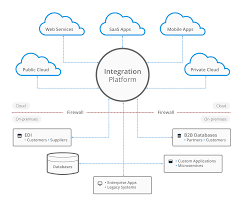The Importance of Quality Software
In today’s digital age, quality software plays a crucial role in the success of businesses across various industries. Whether it’s a mobile application, a web platform, or an enterprise system, the importance of delivering high-quality software cannot be overstated.
Reliability and Performance
Quality software is reliable and performs consistently under different conditions. Users expect seamless functionality without crashes or errors. By ensuring quality in software development, businesses can build trust with their users and maintain a positive reputation.
Security and Data Protection
Security vulnerabilities in software can lead to data breaches and compromise sensitive information. High-quality software undergoes rigorous testing to identify and address security risks, protecting both the business and its users from potential cyber threats.
User Experience
A well-designed user interface coupled with smooth navigation enhances the overall user experience. Quality software focuses on usability and user satisfaction, leading to increased engagement and retention rates. Positive user experiences can drive customer loyalty and advocacy.
Cost-Efficiency
Investing in quality software development may require upfront costs, but it ultimately leads to long-term cost savings. By preventing issues early in the development process, businesses can avoid expensive rework or post-release fixes. Quality software reduces maintenance costs and improves overall efficiency.
Competitive Advantage
In a competitive market landscape, quality software sets businesses apart from their competitors. By delivering superior products that meet user needs effectively, businesses can gain a competitive edge and attract more customers. Quality software reflects positively on the brand image and contributes to long-term success.
In conclusion, quality software is essential for driving business growth, enhancing user satisfaction, and maintaining a strong market position. Businesses that prioritize quality in their software development processes are better positioned to succeed in today’s digital environment.
9 Essential FAQs About Quality Software: Understanding Its Importance, Benefits, and Competitive Edge
- What is quality software?
- Why is quality software important for businesses?
- How can quality software benefit user experience?
- What are the key characteristics of high-quality software?
- How does security play a role in ensuring software quality?
- What steps can be taken to ensure the delivery of quality software?
- How does testing contribute to maintaining software quality?
- What are the costs associated with developing quality software?
- In what ways can quality software give a competitive advantage?
What is quality software?
Quality software refers to software that meets or exceeds the expectations and requirements of its users. It encompasses various aspects such as reliability, performance, security, usability, and efficiency. Quality software is free from defects and errors, functions consistently under different conditions, and provides a seamless user experience. It is designed and developed with a focus on meeting user needs effectively while adhering to industry standards and best practices. Ultimately, quality software not only meets technical specifications but also adds value to the end users and contributes to the overall success of businesses by driving customer satisfaction and loyalty.
Why is quality software important for businesses?
Quality software is essential for businesses for several reasons. Firstly, it ensures reliability and performance, allowing the software to function consistently without errors or crashes. This reliability builds trust with users and helps maintain a positive reputation for the business. Additionally, quality software enhances security and data protection, safeguarding sensitive information from potential cyber threats. Moreover, a focus on quality improves the user experience by providing intuitive interfaces and smooth navigation, leading to higher user satisfaction and engagement. Ultimately, investing in quality software not only reduces long-term costs by preventing issues but also gives businesses a competitive advantage in the market by delivering superior products that meet user needs effectively.
How can quality software benefit user experience?
Quality software plays a significant role in enhancing user experience in several ways. Firstly, by ensuring that the software is reliable and performs consistently without errors or crashes, users can have a seamless and frustration-free interaction with the application. Additionally, well-designed user interfaces and intuitive navigation contribute to a positive user experience, making it easier for users to accomplish their tasks efficiently. Quality software also focuses on addressing security vulnerabilities, thus instilling trust in users that their data is protected. Overall, quality software not only meets user expectations but exceeds them, leading to increased satisfaction, engagement, and loyalty among users.
What are the key characteristics of high-quality software?
When considering the key characteristics of high-quality software, several factors come into play. Firstly, reliability is paramount, ensuring that the software functions consistently and predictably without unexpected failures. Scalability is another crucial aspect, allowing the software to adapt and perform well as user demands increase. Security features are essential to protect sensitive data and prevent unauthorized access. Usability and a user-friendly interface contribute to a positive user experience, enhancing engagement and satisfaction. Additionally, maintainability and flexibility enable easy updates and modifications to meet evolving needs. Overall, high-quality software exhibits reliability, scalability, security, usability, maintainability, and flexibility to meet the diverse requirements of users effectively.
How does security play a role in ensuring software quality?
Security plays a critical role in ensuring software quality by safeguarding the integrity, confidentiality, and availability of data and systems. A secure software application not only protects against unauthorized access and cyber threats but also instills trust in users. By integrating robust security measures during the development process, such as encryption, authentication mechanisms, and regular vulnerability assessments, software quality is enhanced. Addressing security concerns proactively not only minimizes the risk of data breaches and compliance violations but also contributes to a seamless user experience and long-term success of the software product.
What steps can be taken to ensure the delivery of quality software?
To ensure the delivery of quality software, several key steps can be taken throughout the development process. First and foremost, thorough requirements gathering and analysis are essential to clearly define project objectives and user needs. Employing rigorous testing methodologies, such as unit testing, integration testing, and user acceptance testing, helps identify and rectify defects early on. Continuous collaboration among cross-functional teams, including developers, testers, and stakeholders, promotes transparency and alignment throughout the development lifecycle. Additionally, adhering to coding standards, implementing code reviews, and leveraging automated tools for quality assurance contribute to the overall reliability and performance of the software product. Lastly, ongoing monitoring and feedback mechanisms post-deployment enable continuous improvement and ensure that the software meets evolving business requirements and user expectations.
How does testing contribute to maintaining software quality?
Testing plays a critical role in maintaining software quality by identifying defects, errors, and vulnerabilities that could impact the performance, reliability, and security of the software. Through various testing methods such as unit testing, integration testing, and user acceptance testing, developers can validate the functionality of the software and ensure that it meets the specified requirements. Testing helps to uncover issues early in the development process, allowing for timely corrections and improvements to be made. By conducting thorough testing, software teams can enhance the overall quality of the product, increase user satisfaction, and minimize the risk of costly errors or failures post-release.
What are the costs associated with developing quality software?
When considering the costs associated with developing quality software, it is important to recognize that investing in quality upfront can lead to long-term savings and benefits. While the initial development of high-quality software may require a higher budget due to rigorous testing, skilled professionals, and advanced tools, the potential cost savings from avoiding post-release fixes, customer support issues, and reputation damage are significant. Quality software development minimizes the risks of security breaches, system failures, and user dissatisfaction, ultimately leading to improved efficiency and competitive advantage for businesses in the long run. By prioritizing quality in software development processes, organizations can mitigate risks and deliver products that meet user expectations effectively.
In what ways can quality software give a competitive advantage?
Quality software can provide a competitive advantage in several key ways. Firstly, by offering a superior user experience with intuitive interfaces and reliable performance, businesses can attract and retain customers more effectively than their competitors. Additionally, quality software that prioritizes security and data protection instills trust in users, enhancing the brand’s reputation and reducing the risk of data breaches. Furthermore, cost-efficiency is achieved through quality software development, as it minimizes the need for costly maintenance and rework, allowing businesses to allocate resources more strategically. Ultimately, by delivering high-quality software that meets user needs efficiently, businesses can differentiate themselves in the market and gain a significant edge over their rivals.



